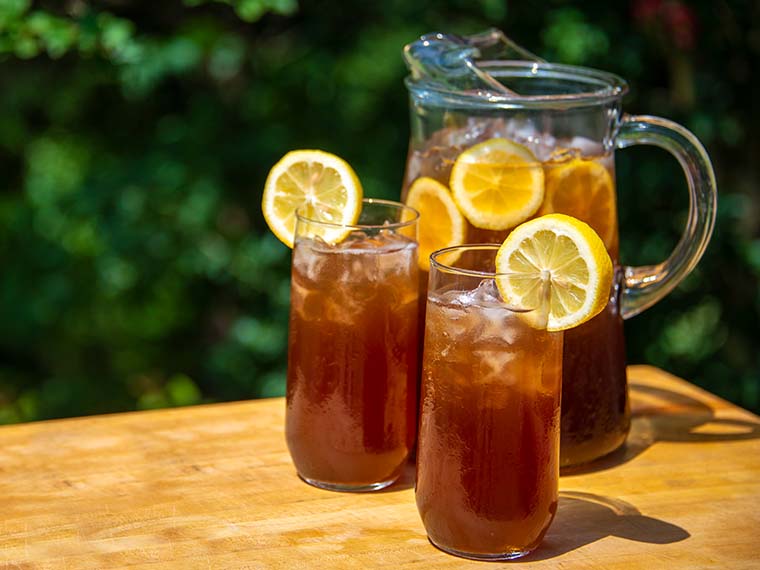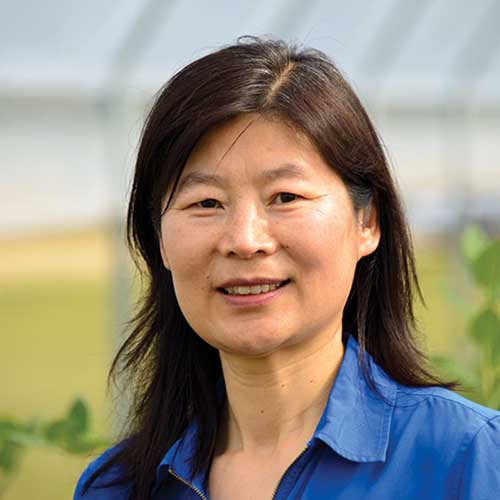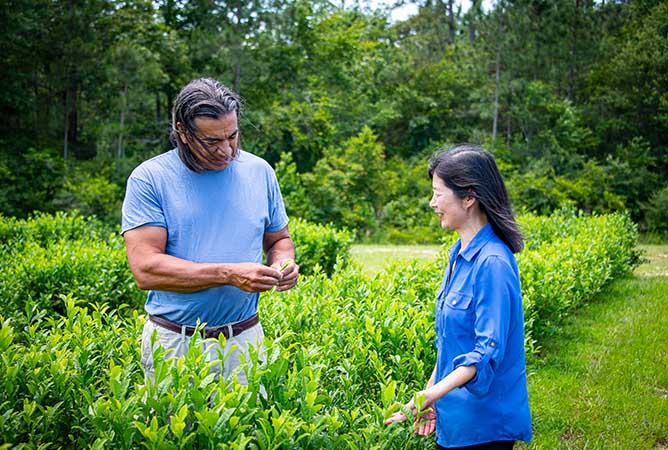Tea Time in Mississippi
MAFES researchers assist producers in niche market
By: Alaina Dismukes

While tea is one of the most popular beverages in the world, 75 to 80 percent of the tea consumed in the U.S. is iced. Sweet tea-a longtime Southern staple-is nearly as old as Mississippi State itself. The oldest known recipe was published in Virginia in 1879. Learn about the tradition of tea at www.mafes.msstate.edu/discovers. (Photo by Janiece Pigg)
The information presented on this page may be dated. It may refer to situations which have changed or people who are no longer affiliated with the university. It is archived as part of Mississippi State University's history.
Did you know that tea is the most popular beverage around the world? Besides water, it is the most widely consumed drink, and it has a history dating back to 2737 BC, believing to have come from the Chinese Emperor Shen-Nung. Legend has it that the emperor discovered tea when a few dried leaves blew into his pot of boiling water and changed the color and taste of the water as if by magic.
Today, iced tea makes up about 75 to 80 percent of tea consumption in the United States, with the country being the third leading importer of tea around the world. Despite its popularity, tea is not widely grown in the U.S. due to high production costs. Mississippi Agricultural and Forestry Experiment Station researchers and Mississippi farmers are working to change that by developing new niche markets for the south's favorite beverage.
Dr. Guihong Bi, MAFES scientist and research professor in plant and soil sciences, along with researchers Dr. Tongyin Li, Dr. Judson LeCompte, and Qianwen Zhang, are all a part of a study entitled "Tea cultivar collection and evaluation trial to support an emerging domestic tea industry."
In this ongoing multiple year study, the researchers are collecting tea cultivars from both domestic and international sources, obtaining data on the basic adaptability of these tea cultivars, and evaluating tea leaf nutrients and antioxidant compounds.
"This project is personally very exciting to me as our goal is to help growers successfully grow and produce tea in Mississippi," said Bi. "We are collecting and evaluating cultivars to identify those best adapted to Mississippi soil and environmental conditions. We aim to provide a viable alternative crop to Mississippi growers and increase consumer access to locally produced tea."
By working alongside tea growers, like Jason McDonald from the Great Mississippi Tea Company in Brookhaven and Don VandeWerken and Jeff Brown from the Pearl River Tea Company in Poplarville, the researchers were able to gather data on the process of producing tea in Mississippi, which is one of 17 states in the country that has tea growers.
At the same time, they are conducting greenhouse and field studies at the MAFES R. R. Foil Plant Science Research Center evaluating production methods including propagation, water and nutrient management, weed control, harvesting, and processing. By examining various aspects of producing tea, it is evident that there are areas of the U.S. which have the proper soil and climate suitable for growing tea or Camellia sinensis.
"The current findings are that the soil and climate in Mississippi are suitable for growing tea. However, there are a lot of differences in cultivars including leaf size, color, quality, growth habit, and yield as well as a plant's tolerance to heat and cold. For example, there are yellow, purple, or green leaves. Some cultivars are more spread out while others grow more upright, and some cultivars have higher yield and are rich in antioxidant compounds," Bi said.
Collaborating with growers and other university researchers, they currently have over 30 accessions of tea plants that have been collected from nurseries, tea growers, home gardeners, and international sources. The researchers also noted that providing plants with shade after transplanting them into a field improves plant survival rate, especially when irrigation is limited. To do this, they use different shade cloths, a method that limits sun exposure to varying degrees.
Qianwen Zhang, from Yantai, China, is a graduate student who is also an assistant researcher for the project. She first learned about tea culture from a Tea Art class her sophomore year while at Beijing's China Agricultural University (CAU) majoring in viticulture and enology engineering.
"I wrote a paper about the relationships between tea and wine in that class," Zhang said. "I was surprised they shared so many characteristics. For example, they both have a long history, both are one of the most popular beverages around the world, and they have their own sophisticated sensory evaluation system."
Zhang met Bi at a conference at CAU in the second year of her master's program. She was impressed by Bi's lecture about tea research in the U.S., so she contacted her and became steeped in tea research herself.
Her role in the research is to select superior tea varieties for Mississippi, propagate the tea plants, look at shade effects on tea plant growth and leaf quality, and conduct sensory evaluations on tea.
"My favorite part of this project is the selection of superior tea varieties for production in Mississippi. After talking with tea growers in Mississippi, I think this is one of the aspects of the research in which they are most interested. A tea plantation can have approximately 50 to 80 years of commercially useful yield which requires growers to plan well before they plant tea in their fields," Zhang said.
Don VandeWerken and Jeff Brown from the Pearl River Tea Company in Poplarville can attest to benefits of growing tea in Mississippi thanks to the team at Mississippi State University. VandeWerken and Brown, who started out as strictly blueberry growers, wanted to expand production with a specialty crop. That is when they heard about growing tea.
"About eight or nine years ago, I was listening to Felder Rushing on National Public Broadcasting," VandeWerken said. "He mentioned in one of his radio shows that he used to grow tea down here in Poplarville for research, so I became curious about the business. We got our first cutting from North Carolina, and that is how we learned about Dr. Judson LeCompte and Dr. Bi. Later, they connected us to Dr. Zhi Yu, a Chinese tea scientist and visiting scholar in Dr. Bi's lab."
They started growing two types of tea plants about eight years ago, Camellia sinensis sinensis and Camellia sinensis assamica, and they now have over ten thousand plants and have been harvesting and selling tea for the last three years.
The Pearl River Tea Company has two types of tea, black or green, in about nine different flavors. Their most popular tea, gingerbread tea, is a combination of black tea and orange peel with cinnamon.
"Like blueberry bushes, tea plants like the same soil acidity and weather. This makes Mississippi a good place for growing tea because we have the right climate and soil for the crop," said VandeWerken.
Together, tea growers and MAFES researchers, have laid the groundwork to grow tea in Mississippi, which certainly adds a refreshing addition to the U.S. market.
This research is funded by the Mississippi Agricultural and Forestry Experiment Station and the Mississippi Department of Agriculture and Commerce.
We are collecting and evaluating cultivars to identify those best adapted to Mississippi soil and environmental conditions. We aim to provide a viable alternative crop to Mississippi growers and increase consumer access to locally produced tea.
Dr. Guihong Bi
Behind the Science

Guihong Bi
Research Professor
Education: B.S., Horticulture, M.S., Biology, Shandong Agricultural University; Ph.D., Horticulture, Oregon State University
Years At MSU: 14
Focus: Improving production efficiency of specialty crops, emphasis on new crops, water, and nutrient management
Passion At Work: : I am passionate about helping specialty crop producers improve production efficiency and profitability while maintaining environmental sustainability.

